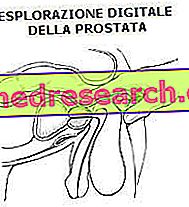Generality
Itchy feet is a fairly common symptom, which can cause significant discomfort in sufferers.

This disorder may depend on numerous pathological and non-pathological conditions. In many cases, itching on the feet depends on trivial reasons, such as excessive sweating, dry skin or an insect sting. At other times, this symptom indicates the presence of diseases of various magnitudes and nature (including dermatoses, liver diseases, diabetes, uremia, neurological disorders and blood circulation problems).
In addition to the itchy sensation on the feet, burning, stinging, numbness, swelling and blisters may also occur depending on the triggering cause. If intense, this symptom causes the desire or reflex to scratch, so it can predispose to inflammation, excoriations and secondary infections.
In most cases, itchy feet have a transient duration and resolve spontaneously. However, if this symptom is persistent and spread to other parts of the body, it is always best to consult a doctor in order to get an accurate diagnosis.
Depending on the cause, itchy feet can be treated with a specific and targeted treatment.
What's this
The itchy feet is a symptom that can be limited to some areas or generalized (the latter is more concerned with a localized manifestation): based on the cause that caused its appearance, therefore, this symptom can affect the whole foot or strike only the back, the plant or the area between the fingers . The itching of the feet may present itself as the only manifestation or may be associated with other signs .
The itchy sensation can manifest itself during the day or be accentuated at night, creating difficulties even to fall asleep.
Itchy feet can affect any age group, from children to the elderly.
Causes
Itching of the feet is an indication of the presence of many skin diseases, but not only. Often, this symptom depends on trivial causes, easily remedied with the appropriate precautions, as can happen, for example, in the case of skin dehydration or the bite of a mosquito in the summer period.
Other times, however, itchy feet are a sign of more important diseases, which should not be underestimated.
Dermatological diseases
Itching of the feet is often caused by primitive dermatopathies or secondary skin conditions related to other diseases (such as, for example, diabetes, liver disease or allergies).
The most frequent causes include:
- Dryness of the skin (xerosis);
- Puncture of an insect (eg mosquitoes, pappataci or tunga penetrans, or the "sand flea");
- Excessive sweating ;
- Dyshidrosis (or dyshidrotic eczema);
- Plantar warts .
Severe itching localized to limited areas of the feet, associated with other skin signs, may indicate the presence of:
- Solar erythema ;
- Atopic dermatitis ;
- Urticaria ;
- Psoriasis ;
- Tinea pedis (or athlete's foot) and other fungal skin infections ( dermatophytosis ).
The skin of the feet can be itchy even in the event of contact dermatitis, an inflammation triggered by interaction with irritants or allergens:
- Irritative contact dermatitis (secondary to repeated contact with an irritant, without the activation of the immunological response; substances that can trigger reactions of this type include: nickel, cobalt, locally applied drugs, detergents, fabrics and cosmetic products) ;
- Allergic contact dermatitis (caused by exposure to an allergen, capable of triggering an immune reaction in previously sensitized subjects).
The itching of the feet can also depend on generalized allergic phenomena : food allergies or reactions to drugs can give rise to cutaneous manifestations, including the symptom in question.
Other dermatological diseases that can occur with itchy feet and lower limbs include:
- Chronic lichen simplex (or neurodermatitis);
- Bullous pemphigoid;
- Psoriasis;
- Scabies;
- Exanthematic diseases (eg varicella).
Systemic disorders
If the itching on the feet is particularly persistent, it could depend on systemic diseases, with or without associated cutaneous manifestations.
The most common causes are:
- Allergic reactions (to drugs, food, animal bites and insect bites);
- Cholestasis ;
- Kidney failure ;
- Hepatopathies ;
- Hepatic failure .
Other systemic causes of itchy feet include:
- Thyroid dysfunction (hyperthyroidism, hypothyroidism, etc.)
- Diabetes;
- Dermatitis herpetiformis;
- Iron deficiency anemia.
The itching of the feet accompanied by a sense of heaviness and tingling in the legs, on the other hand, can be the manifestation of a circulation disorder (eg venous insufficiency, thrombosis etc.) and blood pressure problems. Even the chilblains can start with itching and burning in the toes; this condition represents the damage to blood vessels due to exposure to cold.
Less frequent causes of itchy feet are:
- Freezing;
- Hodgkin's lymphoma;
- Polycythemia vera.
Itching of the feet in pregnancy
The itching of the feet may also occur during gestation, especially in the last quarter.
In this case, the itchy sensation may be due to three main conditions :
- Pregnancy cholestasis ;
- Herpes gestationis (or pemphigoid gravidarum);
- Polymorphic dermatitis of pregnancy .
Other factors can contribute to itching the feet, such as high transaminases during pregnancy, hormonal changes, water retention or liver disease.
Drugs and other iatrogenic causes
Pruritus on the feet can be induced by the use of certain drugs, capable of triggering an allergic reaction or directly inducing the release of histamine.
Morphine, aspirin, barbiturates, penicillin, antifungal agents, chemotherapeutic agents and some contrast agents administered intravenously are the most common cause of this symptom.
Other causes of itchy feet
In some cases, itchy feet can be neuropathic, that is connected to pathologies of the CNS or peripheral nervous system, as in the case of:
- Multiple sclerosis;
- Herpes zoster (or shingles).
Some people particularly "sensitive" to the rhythms of life, feel the desire to scratch themselves, even when they are not affected by particular problems. This is the case, for example, of the itching of the feet that occurs along with other somatic symptoms, during particularly stressful periods from a physical and psychological point of view.
Furthermore, itchy feet can be associated with psychiatric disorders or diseases, such as:
- Depression;
- Anxiety;
- Hypochondria;
- Schizophrenia;
- Obsessive-compulsive disorder;
- Various forms of psychosis.
Symptoms and Complications
The itching of the feet can manifest itself as an annoying sensation, similar to tickling. The disorder and the manifestations associated with it can be triggered by different stimuli: a slight touch, a vibration and contact with wool fibers.
The itching can be localized only in some areas (for example: heel, back, fingers or plant) or generalized, that is, spread to the whole foot.
Depending on the aetiology, itching may be accompanied by other symptoms, always located at the level of the foot, such as:
- Burning sensation ;
- Pizzicore ;
- Redness (diffuse or patchy erythema);
- Swelling (edema).
The presence of signs on the skin that accompany the itching of the feet, such as in the case of eczema, psoriasis or hives, can easily make the cause of the disorder understand.
These may include:
- Papules, blisters or boils;
- Pustules, erosions and crusts;
- Ulcers.
- Xerosis (dry skin) and scaling;
- hyperkeratosis;
- Surface skin thickening (lichenification);
- Rhagades (linear fissures of the skin).
Itchy feet: when does it manifest?
Depending on the cause, itchy feet can present as a sporadic (associated with a single episode), continuous or recurrent manifestation (it is necessary until the underlying pathology is resolved).
Possible complications
If very intense, itching in the feet may induce the person to desire or to scratch himself; this behavior should be avoided, as it can predispose to:
- Inflammation;
- excoriation;
- Secondary infections (bacterial overlaps);
- Eczema chronicization.
Usually, itchy feet are a minor and harmless disorder. However, if this symptom is persistent or frequent, it is advisable to undergo a careful medical evaluation to establish with certainty the cause of the disorder and start the most appropriate therapy for your case.
Diagnosis
Diagnosis of itchy feet is performed by the general practitioner or dermatologist . An analysis of its characteristics and any associated symptoms is necessary to interpret this manifestation, to understand its origin and its seriousness.
To investigate the causes of this symptom, first of all, the doctor asks a series of questions related to the symptomatology and personal medical history, then asks the patient to clearly describe the disorder and the correlation with other concomitant manifestations.
Once the collection of anamnestic data has been completed, a careful objective examination is performed. The doctor examines the skin of the feet to verify the possible presence of alterations or signs indicative of a dermatological disease.
The physical examination can further guide the diagnosis, focusing on:
- Time of debut;
- Type and location of injuries.
The results of medical history and physical examination help to decide if further tests are needed to establish the origins of the itchy feet.
Sometimes, however, itchy feet are a manifestation of diseases that have already been diagnosed, such as in the case of allergies, kidney failure or hematological diseases. Medical check-ups must be carried out especially in the event of pregnancy or in the presence of diseases such as diabetes and liver disease.
Other surveys
If the diagnosis is unclear or the doctor is unable to establish with certainty the triggers of itching on the feet, investigations may be indicated to rule out important diseases, such as diabetes.
These exams may include:
- Blood analysis;
- Urinalysis;
- Microbiological cultures;
- Allergic tests.
When to consult a doctor
Itchy feet can be an early symptom of particular diseases, so it should be interpreted as an alarm bell . In some cases, in fact, the itchy sensation localized to the feet precedes the appearance of the important clinical signs of the pathology in question and is very important to arrive at a diagnosis.
Some examples:
- In Hodgkin's lymphoma, intense itching is one of the spy symptoms; this is accentuated at night and is accompanied by intense sweating.
- A diffuse pruritic sensation, triggered or accentuated by contact with water (the so-called aquagenic itching) is a symptom suggestive of polycythemia vera, a disease characterized by excessive production of red blood cells.
Treatment
Treatment varies depending on the aetiology of the itch on the feet. The strategies to alleviate this symptom, in fact, are many and it is necessary to intervene in a targeted way on the factors that triggered it.
drugs
In the event that the triggering cause can be of pathological origin, the itchy feet can be relieved by topical drugs (cream, ointment, lotion or ointment to be applied directly on the area) or systemic (for serious or extensive reactions, to be taken by way of oral or other route of administration).
The most commonly used medicines include:
- Antihistamines : they inhibit the release of histamine, thereby reducing the itchy symptoms;
- Corticosteroids : anti-inflammatories and immunosuppressants, are useful in cases where the itching of the feet is linked to diseases that cause severe inflammation of the skin (such as psoriasis) and see the involvement of the immune system;
- Antifungals : used in the case of itchy feet due to mycosis (eg ringworm or athlete's foot);
- Antiseptics or antibiotics : they are used in the presence of an exudative or blister-bullous component, to prevent infectious complications.
Symptomatic remedies
In addition to any necessary pharmacological treatment, there are several symptomatic remedies that can alleviate discomfort.
First of all, the choice of breathable shoes and socks made with natural yarns (such as cotton and linen) can help to prevent the problem of itchy feet.
To limit the duration and frequency of itchy episodes it is possible, for example, to resort to some small precautions, such as:
- Keep the skin clean and dry: corn starch and talcum powder help to absorb excess sweat;
- Make footbaths with warm water and mild detergents (alternatively, for an antibacterial and soothing function, add essential oils of lavender, tea tree or rosemary);
- Avoid potential irritants (eg narrow shoes or woolen socks);
- Use emollients / moisturizers to restore the skin's barrier function.
Sodium bicarbonate dissolved in water is excellent for cooling and preventing irritation. On the other hand, due to the swelling associated with dermatitis or insect bites, adding salt to the foot bath may help.
In pregnancy, itchy feet can be relieved by massages or simple exercises to reactivate the circulation (such as, for example, stretching the tips of the feet repeatedly).



